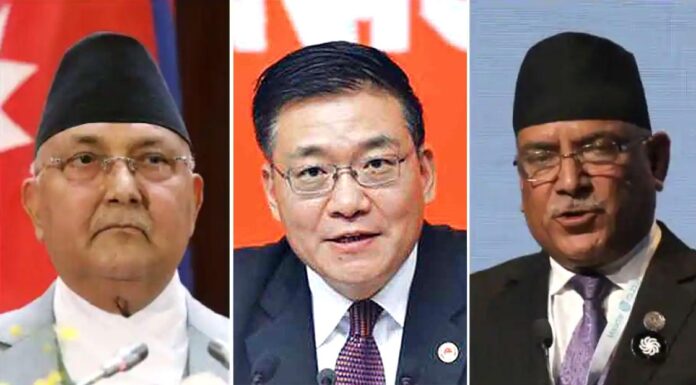
(TibetanReview.net, Dec31’20) – A four-member Chinese delegation led by Guo Yezhou, vice-minister of the International Department of the Communist Party of China, has returned home from Kathmandu on Dec 30, with its aim to unite the divided Nepal Communist Party (NCP) in the wake of the dissolution of Parliament on Dec 20 having failed. However, as if to make a point of being on equally friendly terms with the other major political parties in the country, the delegation has invited Baburam Bhattarai (Chairman of Janata Samajbadi party) and Sher Bahadur Deuba (President of Nepali Congress), to China on the centenary celebrations of the Communist Party of China.
Meanwhile Chinese ambassador Hou Yanqi continues to remain in touch with both sides to keep the alliance intact for the elections next year in what reports from Kathmandu described as Beijing’s plan B, reported the timesofindia.com Dec 30.
Although the NCP is believed to have been broken into two factions — one led by Oli and other by former prime ministers of Nepal Pushp Kamal Dahal, or Prachanda, and Madhav Kumar Nepal — they are yet to announce it formally, noted theprint.in Dec 31.
The report noted that delegation leader Guo had played an instrumental role in the creation of the NCP which was formed in May 2018 by uniting the two major Left parties of Nepal — the Communist Party of Nepal (Unified Marxist–Leninist) led by Oli, and the Communist Party of Nepal (Maoist Centre), led by Prachanda.
China considers the situation in Nepal to have vital implications for maintaining stability in occupied Tibet and also has major investment stakes in the country, including those under President Xi Jinping’s Belt and Road Initiative.
Besides, the Chinese government has invested heavily in the NCP and wishes to see the party continuing in power, uniindia.com Dec 30 cited Professor SD Muni, a well-known Nepal expert, as saying.
Nepal shares a 1,389 km-long border with Chinese occupied Tibet.
Over three days, the team met Nepal President Bidhya Devi Bhandari, Prime Minister K P Sharma Oli, and rival NCP leaders Pushpa Kamal Dahal ‘Prachanda’ and Madhav Kumar Nepal in a bid to resolve the differences between the ruling party leaders, reported the indianexpress.com Dec 31.
However, both NCP factions told the delegation that this would not be possible. In particular, Oli and Bhandari told the Chinese team that Nepal did not need any outside help to handle the crisis, the report said.
Left to return home empty handed, the delegation then met with two leaders from Opposition parties. It told Sher Bahadur Deuba of the Nepali Congress and Baburam Bhattarai of the Janata Samajbadi Dal that China was keen to work with all major parties in Nepal, in what is seen as a message to NCP leaders, the report noted.
The timesofindia.com report cited senior leader of the Dahal-Nepal NCP and former minister Ram Karki as saying there was no other way for Oli to accept his mistake other than rolling back the decision to dissolve the Lower House.
“Oli has left no space for unity with his decision to dissolve the House. Our government was in majority when he plunged the country into uncertainty with his decision,” Karki has said.
Karki has emphatically denied allegations that China was interfering in Nepal’s internal affairs, claiming it was only natural for Beijing to assess the situation when uncertainty prevailed.
He has also said Dahal’s party will continue to follow a “policy of balance” with India and China.





